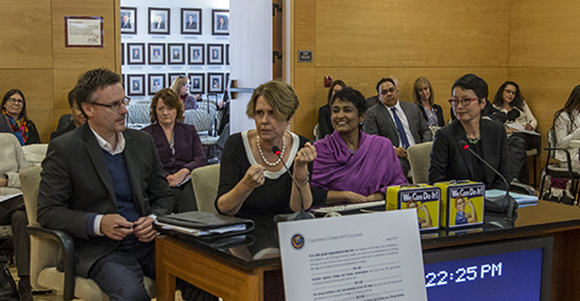
Leaders from the Task Force on Workforce, Job Creation and a Strong Economy address the California Community Colleges Board of Governors. (Photo Credit: Steven Hellon)
The California Community College Board of Governors approved unanimously—and one would have to add enthusiastically– all 25 recommendations of its Task Force on Workforce, Job Creation and a Strong Economy at the Governors’ November meeting which was held at Mt. San Antonio Community College Monday in Walnut.
The 26-member Task Force was compose half of members from inside the community college system and half from outside representing business, labor and equity groups.
The report, which was developed, produced and reviewed in only nine months, addresses strategies and policies needed in the community colleges to help California close its considerable job skills gap, which is defined as California needing one million workers credentialed for middle-skill jobs.
The main areas covered in the recommendations have to do with:
- Student Success
- Career Pathways
- Workforce Data and Outcomes
- Curriculum
- CTE Faculty
- Regional Coordination
- Funding
Vice Chancellor Van Ton-Quinlivan garnered particular praise for her energetic leadership of this very complicated process–which lasted only 9 months– from both task force members and the Board of Governors.
Letters of support from business, labor and the California Economic Summit were noted as well as a procession of task force members and other interested parties who came to Walnut to urge adoption of all of the recommendations.
“This is the closest thing there is to a silver bullet for our region,” said Fresno Business Council CEO Deb Nankivell, who traveled 200 miles to give her testimony.
Orange County Business Council Vice President Alicia Berhow echoed that theme saying “Orange County needs to develop more homegrown talent to live here and work here,” while indicating that the workforce in her county was aging faster than it was being replaced. She urged unanimous approval.
Nicole Rice is Policy Director for the California Manufacturing and Technology Association and expressed strong support for the recommendations because of the urgent need for qualified manufacturing workers.
“We have a rapidly retiring workforce (average age is 56) and often times we can’t find employees ready for the industrial trades,” Rice said. “These recommendations get to the heart of what is needed.”
In addition to an aging workforce, the needs of business are changing faster than the community colleges have been able to address in past years.
Sunita “Sunny” Cooke is the president/superintendent of Mira Costa College and a co-chair of the Task Force. She told the Board of Governors that she learned the workforce is changing so fast the colleges must work to adjust faster.
In particular that means the need for faster development and approval of Career Technical Education (CTE) curriculum that will prepare community college students for jobs that are available.
“Can we speed up curriculum development?” asked Board of Governors Vice Chair Cecilia Estolano just before the vote was taken. “Because that’s what business needs,” Curriculum changes often take two to three years, a process that the report recommends can be done much faster and more efficiently.
What happens next is critical because, as Estolano said, the implementation phase is “where the rubber meets the road” if the report’s recommendations are actually going to make a difference.
Chancellor Brice Harris said that no implementation plan is expected until early 2016, most likely at the January meeting.
When the vote was taken, it was unanimously approved and the audience broke out in applause.
It was deserved.
1,200 Californians participated in the Task Force process up and down California. The high enthusiasm for the report was palpable in the room, along with the acknowledgement of the importance of taking the work and turning it into action.
Los Angeles Chamber of Commerce Vice President Alma Salazar summed up both the urgency and importance of the work.
“Count on the Chamber to be a partner in the implementation,” she told the Board of Governors. “The Community Colleges are a linchpin to a qualified workforce.”

